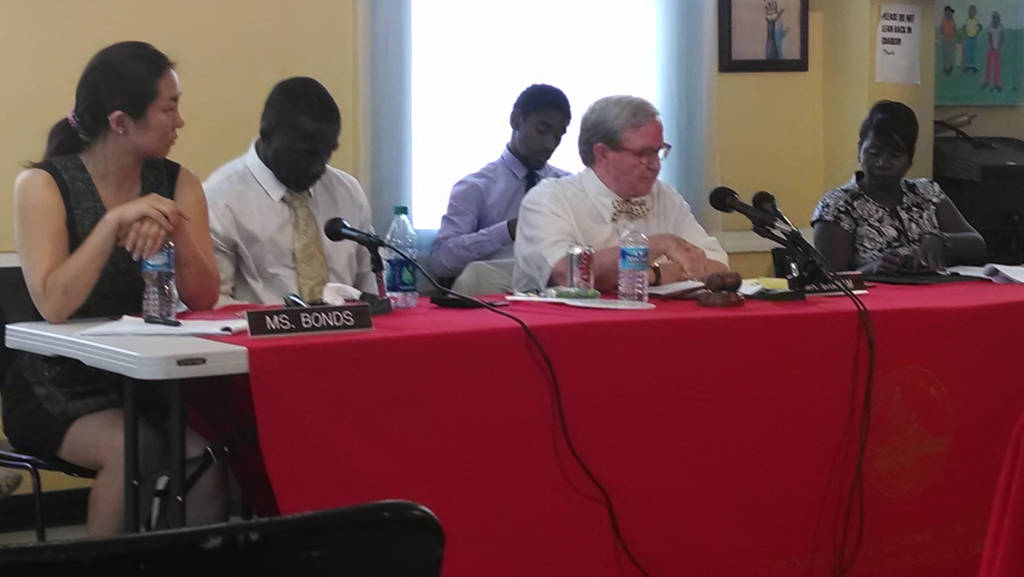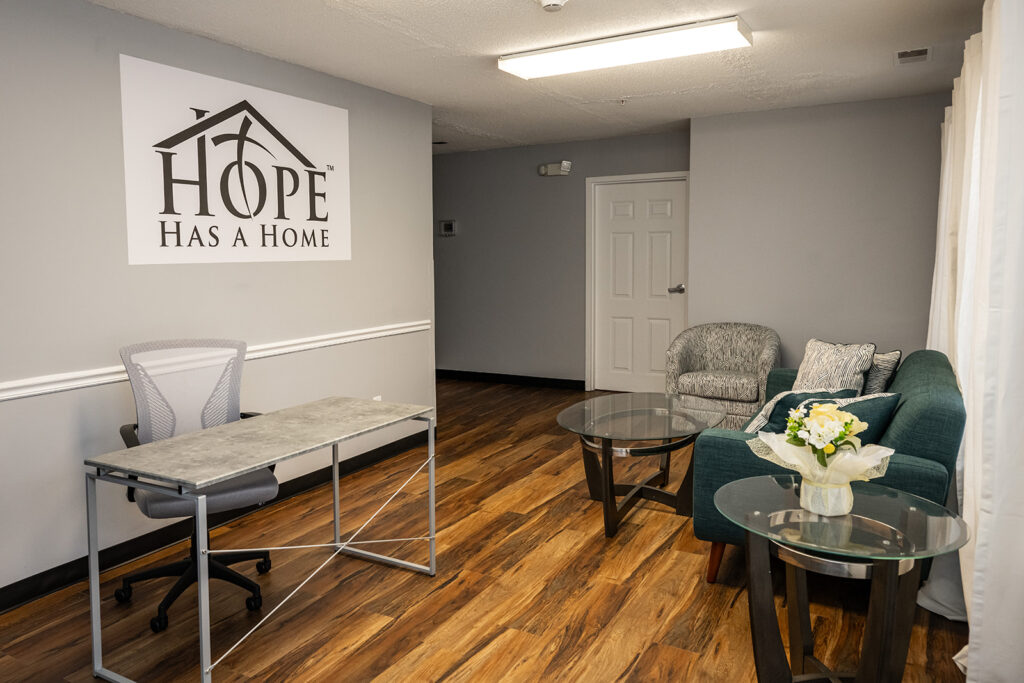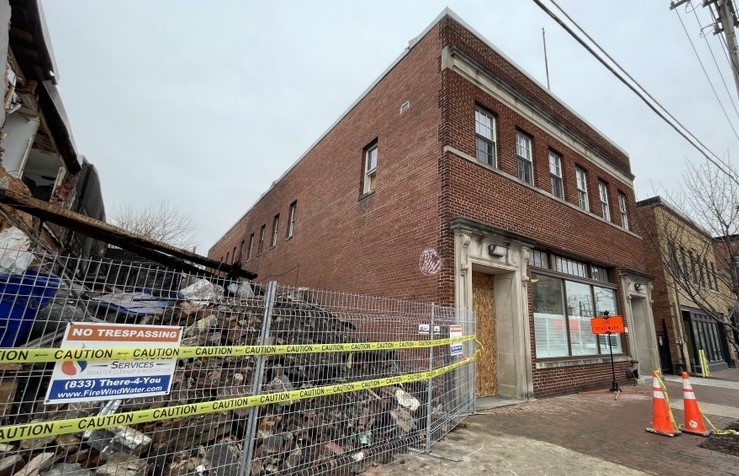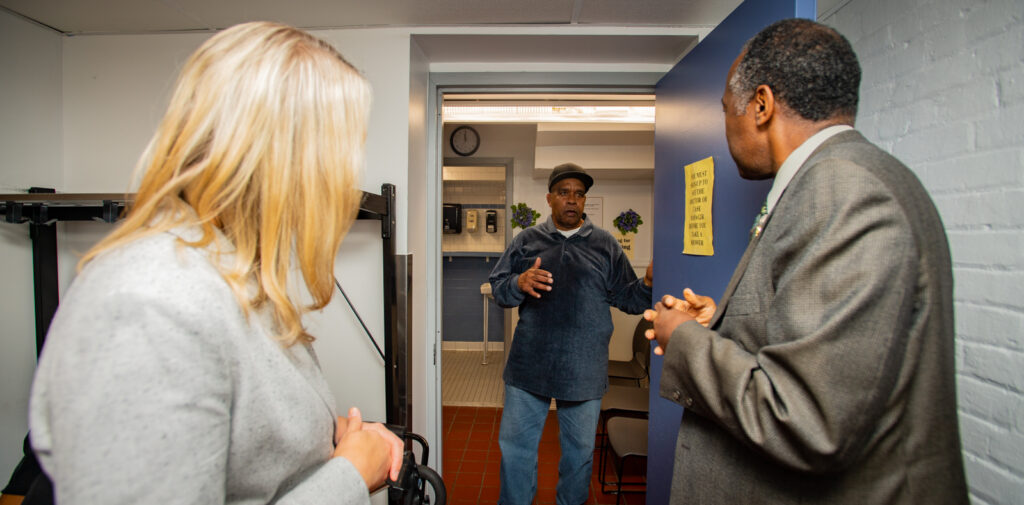Any new facility that is built to replace the historic 1,350-bed Federal City Shelter should include a mix of accommodations including low-cost permanent supportive housing and 24-hour emergency and hypothermia shelter beds.
That is just one out of a list of recommendations approved by a specially-appointed task force convened last year to ponder the future of the downtown shelter. The facility is often known simply as CCNV, for the Community for Creative Non-Violence, the anti-war and anti-poverty group that turned the former federal college building into a shelter nearly 30 years ago.
At a final June 13 meeting, the CCNV task force approved a list of principles intended to guide the city in planning for the possible replacement of the shelter, located at 425 2nd Street NW. The building also houses five different non-profits dedicated to providing health, employment, nutritional, and medical services to the poor and homeless. They include Clean & Sober Streets and DC Central Kitchen.
The CCNV task force, made up of representatives from homeless-advocacy groups and government agencies, was asked to consider different scenarios for the aging facility in advance of the 2016 expiration of a federal requirement that the building be used for homeless services.
The structure is deteriorating, raising questions about its viability. The District spends roughly $2.5 million a year on utilities and maintenance, yet, attempts to shore up the facility are not always adequate. The panel ruled that any replacement shelter should be built before the existing shelter is torn down. It also recommended that, should a new building be constructed at a different location, it should be close to public transportation and ideally located downtown. The task force also stated that non-shelter-related social services should be included to the fullest extent possible in any new facility. CCNV owns a parking lot next to the shelter, but none of the task force recommendations addressed possible plans for future use of the property.
Eleven members of the task force’s committee on recommendations voted to approve the guidelines. One member voted “no” and one member abstained.
Casting the only “no” vote was ex-officio task force member Julia Lightfoot, the founder of Clean & Sober Streets, which has provided drug and alcohol treatment services since the 1980s. Lightfoot said she believed the task force had developed a good model, but was concerned with the final set of guidelines. In explaining her vote, she harked back to the guiding principles of CCNV, as exemplified by the group’s late leader, the charismatic Mitch Snyder, who staged hunger strikes and led other protests highlighting the need for the shelter to the administration of President Ronald Reagan.
“I knew Mitch,” she said. “His mission didn’t have to do with money; it was his commitment to the homeless population.”
She explained the inclusion of 24-hour care, which Snyder was a great advocate for, was important because “no one’s going to get better if they don’t know where they will sleep that night.”
In response to Lightfoot, task force chair and DC Council Member Jim Graham (D-Ward One) stressed that 24-hour care is included in the statement of principles approved by the group.
CCNV Executive Director Rico Harris abstained from the vote. The atmosphere in the room quickly tensed when he explained his decision.
Harris read aloud a letter signed by himself and several other members of the CCNV board of directors. The document expressed an aversion to the task force in general, as well as the manner in which its work has proceeded throughout the past months.
Harris maintained that CCNV never asked for the establishment of the task force and that he only attended the meetings in order to comply with the act that created the force.
“We didn’t ask for advice from a group about our property,” Harris said.
He also argued that the procedures of the task force went beyond the intent of the act and that meetings focused more on the CCNV’s closing than its new location. He also said he disliked that members of the wider Federal City Shelter community used the public-comment portions of some meetings “as an open mic session” to complain about conditions at the shelter, resulting in what he called “a slanted record of the CCNV.”
Graham responded that the CCNV property belongs to the DC government and not to CCNV itself. As a result, he said, the task force had not represented an outside entity taking over the procedures. Graham went on to defend the task force, saying its work is “about an interrelationship among a large number of organizations, how we come together to make the living better for those [seeking shelter at the CCNV].”
Harris handed a copy of his letter to Graham. However, after reviewing it, Graham mentioned his copy did not include all the points Harris made at the meeting and questioned whether all the signatories agreed with the arguments Harris made.
Although Graham was defeated in his primary bid for reelection and will not return to the DC Council next year, he said he will try to continue to advance the project. As the final meeting of the group drew to a close, Graham, who chairs the DC council’s human services committee, reflected on the work of the group.
“I’d hoped it would have a more amicable conclusion,” he said. “There is no single entity working on its own, we all come together, we all have to have respect for each other. We have a vision for something a whole lot better.”
He said he hoped task force members, as well as members of the audience, many of whom were homeless or formerly homeless, would continue to collaborate.
“We’re going to continue to work together. Aren’t we going to work together?”
Listeners nodded yes.
A roundtable discussion for community members is being planned for coming weeks. Details are still being finalized.








